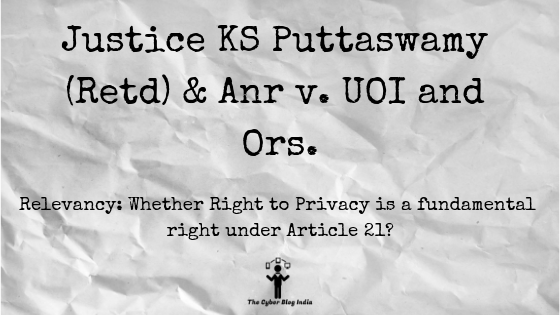Justice KS Puttaswamy (Retd) & Anr v. UOI and Ors.

Justice K.S. Puttaswamy (Retd) & Anr v. UOI & Ors
In the Supreme Court of India
W.P. (C) No. 494 of 2012
Before Chief Justice J.S. Khehar, Justice J. Chelameswar, Justice S.A. Bobde, Justice R.K. Agrawal, Justice R.F. Nariman, Justice A.M. Sapre, Justice (Dr.) D.Y. Chandrachud, Justice S.K. Kaul and Justice S.A. Nazeer
Decided on August 24, 2017
Relevancy of the case: Whether Right to Privacy is a fundamental right under Article 21?
Statutes & Provisions involved
• The Information Technology Act, 2000 (Sec 66E)
• The Constitution of India, 1950 (Article 19(1)(a), 19(1)(d), 21)
• The Aadhaar Act, 2016 (Section 7, 29, 33, 47, 57)
Facts of the Case
• In 2012, Justice K.S. Puttaswamy (Retired) filed a petition in the Supreme Court challenging the constitutionality of Aadhaar on the grounds that it violates the right to privacy.
• The Petitioner argued before the nine-judge bench that this right was an independent right, guaranteed by the right to life with dignity under Article 21 of the Constitution. The Respondent submitted that the Constitution only recognized personal liberties which incorporated the right to privacy to a certain extent.
• The case came before a three judge Bench of the Court which, on 11 August 2015, ordered that the matter should be referred to a larger Bench of the Court.
• On 18 July 2017, a five judge Constitution Bench ordered the matter to be heard by a nine judge Bench to determine whether there was a fundamental right to privacy within the Constitution.
Opinion of the Bench
All the judges unanimously overruled the law laid down in M.P. Sharma v. Satish Chandra and Kharak Singh v. State of U.P which failed to recognize privacy as a fundamental right. The nine judges of the Court gave six opinions. A short summary of those key points include:
- Justice Chandrachud (on behalf of himself, C.J. Kehar, J. Agrawal and J. Nazeer): Privacy is not surrendered entirely when an individual is in the public sphere. Further, they spoke of privacy as a negative and positive right in relation to the state. The Judges also held that there was a need to introduce a data protection regime in India.
- Justice Chelameswar: In his opinion, this right includes autonomy over personnel decisions (e.g. consumption of beef), bodily integrity (e.g. reproductive rights) as well as the protection of personal information (e.g. privacy of health records), etc.
- Justice Bobde: Consent is essential for the distribution of inherently personal data such as health records.
- Justice Nariman: He discussed the law laid down in ADM Jabalpur v. Sivakant Shukla and said that the majority judgment in the said case is no longer good law thus overturning it and making it clear that the right of privacy is an inalienable human right which inheres in every person by virtue of the fact that he or she is a human being.
- Justice Sapre: The right to privacy included an individual’s rights to freedom of speech and expression under Ar 19 (1)(a) and free movement throughout the territory of India under Ar 19(1)(d) that was essential to satisfy the constitutional aims of liberty and fraternity which ensured the dignity, life and liberty of the individual.
- Justice Kaul: The Judge discussed the right to privacy with respect to the protection of informational privacy and the right to preserve personal reputation. Also held that privacy is one of the most important rights to be protected both against State and non-State actors and be recognized as a fundamental right subjected to restrictions like national security.
Decision
The nine-judge bench of the Supreme Court unanimously recognized that the Constitution guaranteed the right to privacy as an intrinsic part of the right to life and personal liberty under Article 21. The right to privacy was given the status of a fundamental right subjected to certain restrictions as it is not absolute.
Personal Opinion
It is a landmark judgment in the realm of traditional as well as digital privacy. The opinions though diverse in nature led to the same conclusion i.e. overruling all the previous judgments and recognizing privacy as a fundamental right. The Court considered detailed arguments on the nature of fundamental rights, its constitutional interpretation, the theoretical and philosophical bases of privacy and other minute aspects before giving it the status of a fundamental right. The fact that privacy is intact even when a person is in the public sphere truly justifies the nature of our democracy. A striking feature of this joint judgment is the detailed treatment of issues of digital privacy which are of increasing importance, both in India as well as internationally. Also, the judgment makes it clear that the Indian Government is now concerned to establish an online data protection regime to protect the privacy of the individual which is great as India is lagging behind in online data privacy regime i.e. proper laws and regulations regarding collection, preservation, and compliance of personal data and related enforcement mechanisms.
इस केस के सारांश को हिंदी में पढ़ने के लिए यहाँ क्लिक करें | To read this case summary in Hindi, click here.
